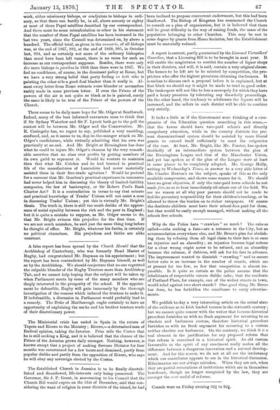It looks a little as if the Government were thinking
of a com- promise of the Education question something in this sense,— that the towns should have rate-paid schools and directly compulsory education, while in the country districts the pre- sent denominational system should be assisted by more liberal grants to extend itself sufficiently to meet the exigencies of the case. At least, Mr. Bright, like Mr. Forster, has spoken decidedly of an intermediate system between the plan of the Birmingham League and that of the Manchester Union, and yet has spoken as if the plan of the League were at least in some places to be completely adopted. Mr. George Melly, writing to Wednesday's Times, iu answer to a very able letter of Mr. Charles Buxton's on the subject, speaks of this as the only available compromise, and shows some reason for it. We should have no great objection, if only the rate-paid town schools be not made free, so as to beat immediately all others out of the field. We see no reason at all why poor parents should not be made to feel the pecuniary responsibility for their children's teaching, or be allowed to throw the burden on to richer ratepayers. Of course the destitute children must have their school-fees paid for them, but that would be easily enough managed, without making all the schools free schools.






























 Previous page
Previous page